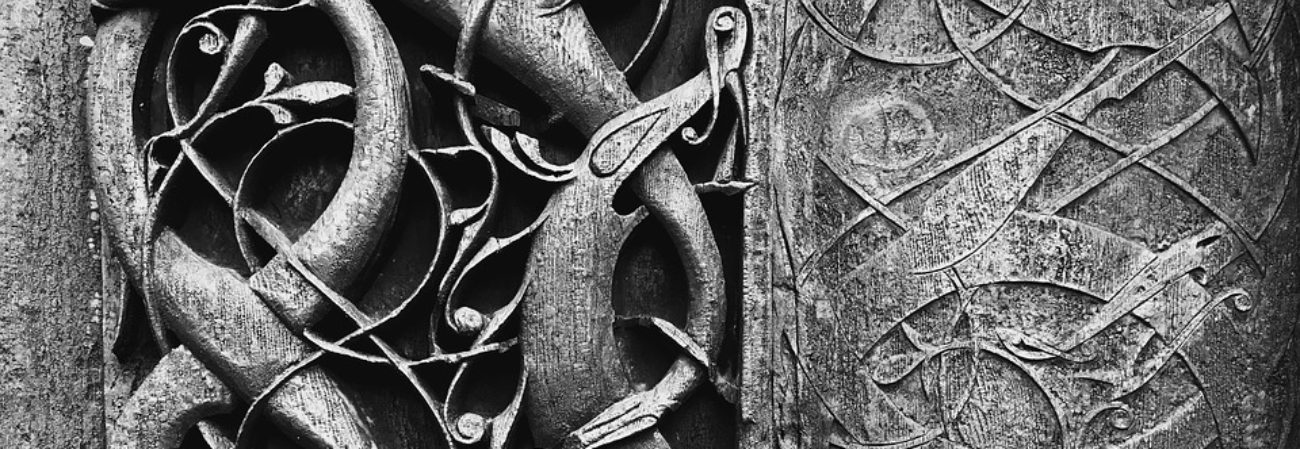 Of any book in my personal library, Maria Kvilhaug’s Seed of Yggdrasil is the most breathtaking in its depth, scope and insight. A graduate of the University of Oslo and a long time scholar of Germanic culture and myths as well as a scholar of the Norse language, Ms. Kvilhaug presents a fascinating foray into the Norse myths as you have never seen them. I found myself murmuring as I read this book “Well that makes sense!” as she explored the myths from the perspective of an open-minded scientist and historian. When you see the myths, not as stories but as allegories, things begin to click into place. When you begin to see evolutionary flow in the stories, you then realize that all of it was intended to be allegory, as any religion founded in Nature, is.
Of any book in my personal library, Maria Kvilhaug’s Seed of Yggdrasil is the most breathtaking in its depth, scope and insight. A graduate of the University of Oslo and a long time scholar of Germanic culture and myths as well as a scholar of the Norse language, Ms. Kvilhaug presents a fascinating foray into the Norse myths as you have never seen them. I found myself murmuring as I read this book “Well that makes sense!” as she explored the myths from the perspective of an open-minded scientist and historian. When you see the myths, not as stories but as allegories, things begin to click into place. When you begin to see evolutionary flow in the stories, you then realize that all of it was intended to be allegory, as any religion founded in Nature, is.
She also writes of spiritual allegory. “When one realizes that a Viking prince has to fight a giant called Hatred, another called Rage and must be reborn in order to win a battle he lost in his previous life, the Battle of the Rock of Greed, in order to restore the Peace of Wisdom and gain entry into the divine afterlife, what at first sight appears to be just another heroic legend of a tough guy who fights giants, become s a spiritual parable. In fact, the moment I started to apply my translated names to the old texts, a whole new world unraveled itself, a world of spiritual concerns, ageless wisdom and metaphysical and philosophical speculation; speculation that is sometimes almost compatible with modern scientific theories.”
Even if you have only a casual interest in the subject of Norse mythology, The Seed of Yggdrasil makes the myths much easier to understand. Furthermore, since the author is a Norse scholar, she is qualified to make judgement calls on translations of certain words, to which she adds her explanation as to why she does. Not only did I gain greater insight into the stories and the all probable likelihood of their place on, I gained greater insight into how the people of the Norse Culture saw their world.
Easy to read and understand, The Seed of Yggdrasil takes on an almost meditative, spiritual experience. Her deeply delving understanding of the Old Norse texts and her unwillingness to take anything previous scholars have written at mere face value without holding it up to the light of in-depth research, her a highly qualified writer on the subject. Because of her extensive studies in Old Norse, she is not simply regurgitating anything that has already been written. She writes about translating a passage from Konungsbók (The Book of the King, written around 1200 CE) while at the University of Oslo and remembers doing a double take at a passage that read “The Earth is as round as a globe.” Clearly the early medieval people comprehended much more than we give them credit for. As any reader of this book will see, Kvilhaug delves extensively into the cosmic myths of the Norse and when seen under her lens, they are seen with fresh insight. It is truly a remarkable experience.
My only pique with this book was not the price, though it was considerable. I paid over fifty dollars for it on Amazon, yet considered it immensely worth it. My issue stems from the fact it does not contain an index. I bought it for research purposes and I found the lack of an index somewhat debilitating. However, I was not adverse to reading such a book cover to cover merely for enjoyment. At well over six hundred pages, it is not a quick read, but certainly a memorable one.


Very informative for my Norse heritage. Want to learn more about it.